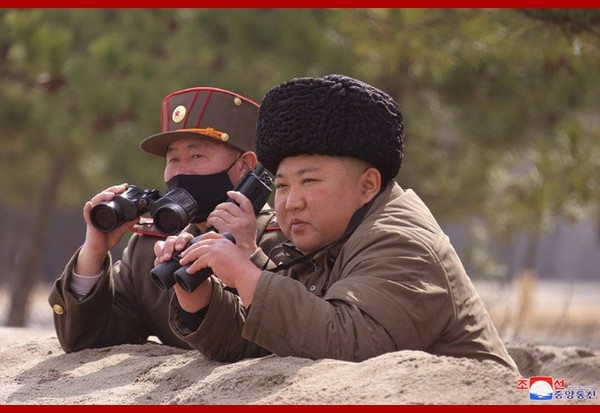
By Jenny Lee WIRED Korea
While leaders around the world are scrambling to rein in a disastrous coronavirus outbreak that has infected close to 106,000 and killed 4,000 to date, Kim Jong Un of North Korea has different priorities and concerns. Or at least this is what North Korea’s latest firing of weapons hints at.
In what appears to be part of a live-fire military exercise, Pyongyang on Monday launched three short-range projectiles off its east coast, some of which South Korea’s military said flew up to 124 miles northeast before falling in waters between the North and Japan.
The launches came days after it had fired two short-range projectiles under the supervision of Kim, who had resolutely pledged in his New Year address that he will no longer be bound by a self-imposed two-year moratorium on long-range missile and nuclear tests. Amid the prolonged deadlock in the nuclear talks with U.S. President Donald Trump, Kim had also warned of imminent action and said ominously it will unveil “a new strategic weapon.”
“Both [South Korean President Moon Jae-in] and Trump have signaled their interest in making a deal with North Korea on weapons this year, but nothing has really come of it,” said Robert Kelly, a political science professor at Pusan National University. “So [weapons testing] is a way for North Korea to bring attention back to that point. This is another way for the North Koreans to pressure Moon and Trump to make some kind of concessions or come back to the bargaining table.”
The containment of the novel coronavirus, COVID-19, is pushed back on the priority list, but does this mean Kim is disinterested in protecting public health? Not quite.
Reports are flowing out of North Korea on a daily basis that indicate that efforts to check the coronavirus infection in the country are in full swing. The regime calls the efforts a matter of “national survival.”
While decades of sanctions have already put the country in international isolation and resulted in limitations on travel, the North moved rapidly to further shut its borders to halt the spread of the virus. Since January, it has banned foreign tourists, suspended flights and train services with China and Russia, implemented a compulsory 30-day quarantine for all arriving foreigners including diplomats and even imposed restrictions on aid workers and international health agencies. Imported materials are also inspected and kept isolated for 10 days.
Foreigners who were under quarantine for weeks in Pyongyang were released last week and some left the country on a specially-arranged flight bound for the Russian city of Vladivostok.
The North, according to the state-run Korean Central Television, has also been actively informing its people of the spread routes and symptoms of the illness while urging them to take preventive measures such as wearing a face mask, washing hands often and sterilizing objects that come in contact with hands. Interactions with foreigners are also strictly restricted.
If the government’s figures are true, there is not a single case of the coronavirus inside North Korea as of yet, despite sharing borders with China and South Korea, two of the four countries hit hardest by the recent outbreak and despite a large number of cases being monitored. According to state media reports, Pyongyang has placed 2,420 people under quarantine in South Pyongan Province, 3,000 in North Pyongan Province, 1,500 in Kangwon Province and 2,630 in Jagang Province.
Suspicion of an outbreak in the country is growing, with reports of deaths intermittently emerging. Daily NK reported on Monday around 200 North Korean soldiers have died from symptoms that may have been caused by the coronavirus, and the North Korean government ordered all hospitals to cremate corpses.
Experts say the North is unable to cope with a health emergency of this magnitude, and hence the reason for the regime’s heightened concern about the new coronavirus.
“North Korea takes such draconian measures as closing its borders and militarily enforcing quarantines to prevent COVID-19 contagion because it does not have the public health capacity to deal with a major outbreak," said Leif-Eric Easley, associate professor of international studies at Ewha Womans University in Seoul.
A number of North Koreans are severely malnourished and therefore susceptible to infection, and diseases like tuberculosis are already rampant. But the country, Kelly said, has limited medical capabilities, with hospitals and other medical facilities lacking medicine, supplies and sanitation. The country’s most critical healthcare needs are met by assistance from foreign NGOs.
“The North Koreans have no real way to mitigate the outbreak,” Kelly said. “The North Koreans won't know what to do, and so they'll just throw the infected people in their concentration camps where they'll basically just be allowed to die.”
Kim's recent moves like firing projectiles and sending a personal letter to Moon in which he voiced his support for the South's fight against the outbreak could well be just a desperate bid for international assistance.
“Kim Jong Un is playing a two-level game,” Easley said. “At the domestic level, his regime claims to protect the people with drastic quarantine measures and military exercises against external threats. Pyongyang may be seeking international assistance, but remains obsessed with not appearing in an inferior position to Seoul.”
저작권자 © WIRED Korea 무단전재 및 재배포 금지
이 기사를 공유합니다


 뉴스레터 신청
뉴스레터 신청